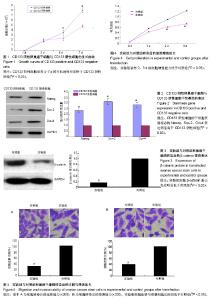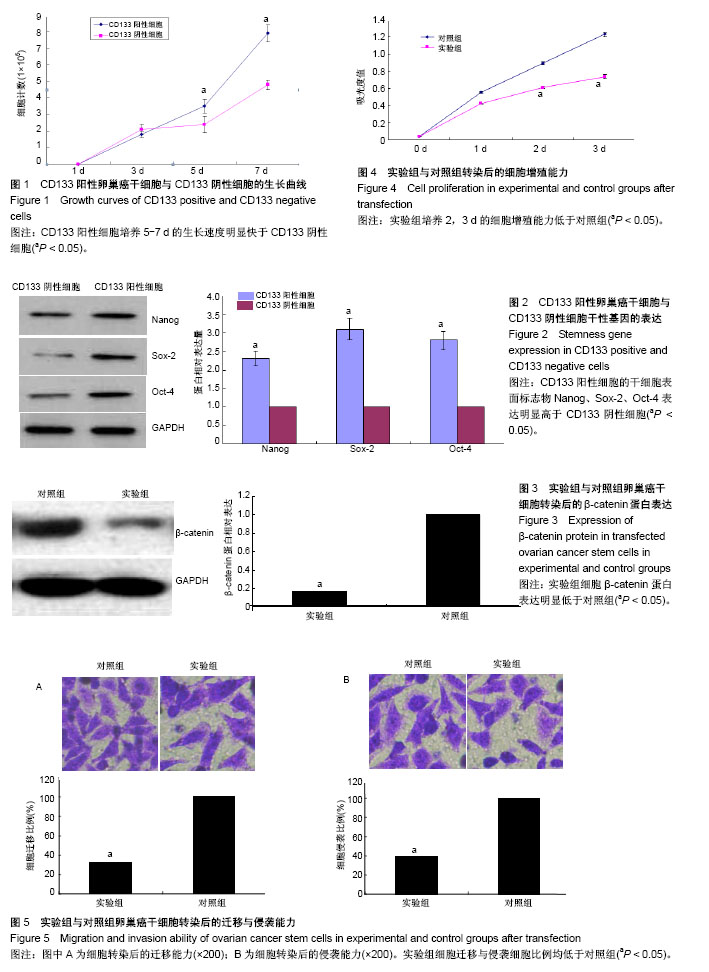| [1] 陈万青,郑荣寿,曾红梅,等.2011年中国恶性肿瘤发病和死亡分析[J].中国肿瘤,2015,24(1):1-10.[2] 施月琴.2007-2015年南通市三区育龄妇女恶性肿瘤死因分析[J].海南医学,2017,28(4):669-671.[3] Van Hoesen K, Meynier S, Ribaux P, et al. Circulating GRP78 antibodies from ovarian cancer patients: a promising tool for cancer cell targeting drug delivery system. Oncotarget. 2017; 8(63):107176-107187.[4] Chien J, Poole EM. Ovarian Cancer Prevention, Screening, and Early Detection: Report From the 11th Biennial Ovarian Cancer Research Symposium. Int J Gynecol Cancer. 2017; 27(9S Suppl 5):S20-S22.[5] Chien J, Mehta G. Meeting Report From the 2016 11th Biennial Ovarian Cancer Research Symposium: Mechanisms of Initiation and Progression of Ovarian Cancers. Int J Gynecol Cancer. 2017;27(9S Suppl 5):S10-S13.[6] 曹颖,傅士龙. 宫颈癌与肿瘤干细胞的研究进展[J].江苏医药, 2017,43(5):356-359.[7] 宋东颖,王毅,孙岚,等.肿瘤干细胞理论及肿瘤干细胞分离和鉴定研究进展[J].中国药理学与毒理学杂志,2012,26(5):674-679.[8] Jiang J, Ye F, Yang X, et al. Peri-tumor associated fibroblasts promote intrahepatic metastasis of hepatocellular carcinoma by recruiting cancer stem cells. Cancer Lett. 2017;404:19-28.[9] Wu L, Han L, Zhou C, et al. TGF-β1-induced CK17 enhances cancer stem cell-like properties rather than EMT in promoting cervical cancer metastasis via the ERK1/2-MZF1 signaling pathway. FEBS J. 2017;284(18):3000-3017.[10] 郑帅,王晓东,崔岱,等.甲状腺未分化癌耐药和转移中肿瘤干细胞和上皮细胞间质的转化作用[J].南京医科大学学报:自然科学版, 2014,34(12):1627-1631,1637. [11] Whiteside TL. Exosome and mesenchymal stem cell cross-talk in the tumor microenvironment. Semin Immunol. 2018;35:69-79.[12] Zanjani LS, Madjd Z, Abolhasani M, et al. Expression of CD105 cancer stem cell marker in three subtypes of renal cell carcinoma. Cancer Biomark. 2017 Dec 20. doi: 10.3233/CBM-170755. [Epub ahead of print][13] 杨森,赖钊,王学文,等.手术切除联合肝动脉化疗栓塞对术后血清肿瘤标志物含量及肿瘤复发过程中干细胞特性的影响[J].海南医学院学报,2017,23(9):1244-1247.[14] 刘蕾,郭宏强,杨树军.肿瘤干细胞信号通路[J].医药论坛杂志, 2014,35(5):176.[15] 李月雅,李凯.Wnt/β-Catenin信号通路对肿瘤干细胞作用的研究进展[J].山东医药,2016,56(9):98-100.[16] Wilms C, Kroeger CM, Hainzl AV, et al. MYSM1/2A-DUB is an epigenetic regulator in human melanoma and contributes to tumor cell growth. Oncotarget. 2017;8(40):67287-67299. [17] Li B, Yu F, Wu F, et al. EZH2 Impairs Human Dental Pulp Cell Mineralization via the Wnt/β-Catenin Pathway. J Dent Res. 2017 Dec 1 doi: 10.1177/0022034517746987. [Epub ahead of print][18] 许峰,程巧莲,张忆雯,等. Let-7通过抑制Wnt信号通路激活而促进食管癌干细胞不对称分裂的研究[J]. 临床医学研究与实践, 2017, 2(16): 8-12. [19] 马勇,王礼宁,郭杨,等. 姜黄素通过调节Wnt/β-catenin信号通路促进软骨细胞增殖的研究[J]. 广州中医药大学学报,2017, 34(1): 90-95.[20] 王海全. 转化生长因子β1通过Wnt/β-catenin信号通路诱导人肝癌细胞SMMC-7721上皮间质转化的实验研究[D].济南:山东大学, 2016.[21] 熊姗姗.Wnt信号通路在维持鼻咽癌SP细胞“干”性的机制研究[D].广州:南方医科大学,2016.[22] 姜睿.Wnt/B-catenin信号通路与鼻咽癌肿瘤干细胞发生的关系[D]. 广州:南方医科大学,2011.[23] 贾冬丽,李红雨,秦巧红卵巢上皮性癌组织中SFRP5基因启动子区甲基化与β-catenin蛋白表达检测[J].郑州大学学报:医学版, 2013,48(3): 355-358.[24] 卢淮武,王东雁,刘昀昀,等. 半乳糖凝集素-3与β-Catenin在上皮性卵巢癌中的表达和临床指标及预后关系[J].中山大学学报:医学科学版, 2015, 36(6): 883-888.[25] 林盛,龙海霞,向橦,等.人卵巢癌组织肿瘤干细胞的分离和鉴定[J].中华肿瘤杂志, 2011, 33(12): 896-899.[26] 宋东颖,王毅,孙岚,等.肿瘤干细胞理论及肿瘤干细胞分离和鉴定研究进展[J]. 中国药理学与毒理学杂志, 2012, 26(5): 674-679.[27] 宋长山,谭家驹.干细胞与肿瘤干细胞[J].新乡医学院学报, 2006, 23(4): 417-420.[28] Zhong W, Chen S, Qin Y, et al. Doxycycline inhibits breast cancer EMT and metastasis through PAR-1/NF-κB/miR-17/ E-cadherin pathway. Oncotarget. 2017;8(62):104855-104866.[29] Zuo LL, Zhang J, Liu LZ, et al. Cadherin 6 is activated by Epstein-Barr virus LMP1 to mediate EMT and metastasis as an interplay node of multiple pathways in nasopharyngeal carcinoma. Oncogenesis. 2017;6(12):402. |



